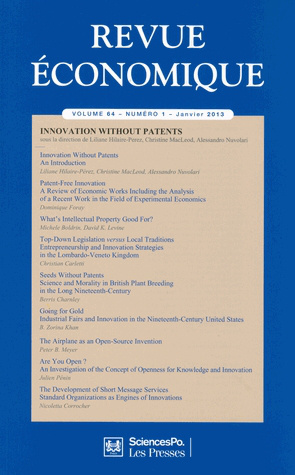Revue économique 64-1, janvier 2013
Innovation without patents
First Edition
Ce numéro dresse un état de la recherche économique et historique sur les brevets. Prenant leurs distances avec l'analyse traditionnelle - selon laquelle le caractère de bien public de l'invention impose le recours au brevet pour préserver à la fois l'intérêt de l'inventeur et celui du corps social -, les auteurs soulignent la difficulté du brevet à concilier usage social optimal et incitation à produire des connaissances. Les expériences pré¬sentées ici, dans des secteurs (aviation, sélection végétale, services SMS) et des contextes institutionnels (académies, prix, open source) très divers, suggèrent que l'innovation sans brevet constitue un monde possible, dont la théorisation s'avère cruciale pour éclairer les politiques d'innovation.
Specifications
- Publisher
- Presses de Sciences Po
- Author
- ,
- Journal
- Revue économique
- ISSN
- 00352764
- Language
- French
- BISAC Subject Heading
- POL000000 POLITICAL SCIENCE
- Onix Audience Codes
- 06 Professional and scholarly
- Title First Published
- 30 January 2013
- Subject Scheme Identifier Code
- Thema subject category: Politics and government
Paperback
- Publication Date
- 30 January 2013
- ISBN-13
- 978-2-7246-3298-9
- Code
- 9782724632989
- Dimensions
- 15.5 x 24 x 1 cm
- Weight
- 270 grams
- List Price
- 24.00 €
- ONIX XML
- Version 2.1, Version 3
Google Book Preview
Contents
Innovation Without Patents
An Introduction
Liliane Hilaire-Pérez, Christine MacLeod, Alessandro Nuvolari
Patent-Free Innovation
A Review of Economic Works Including the Analysis of a Recent Work in the Field of Experimental Economics
Dominique Foray
What's Intellectual Property Good For?
Michele Boldrin, David K. Levine
Top-Down Legislation versus Local Traditions
Entrepreneurship and Innovation Strategies in the Lombardo-Veneto Kingdom
Christian Carletti
Seeds Without Patents
Science and Morality in British Plant Breeding in the Long Nineteenth-Century
Berris Charnley
Going for Gold
Industrial Fairs and Innovation in the Nineteenth-Century United States
B. Zorina Khan
The Airplane as an Open-Source Invention
Peter B. Meyer
Are You Open?
An Investigation of the Concept of Openness for Knowledge and Innovation
Julien Pénin
The Development of Short Message Services
Standard Organizations as Engines of Innovations
Nicoletta Corrocher

